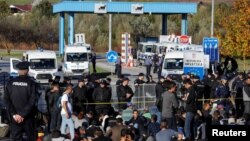The International Federation of Red Cross and Red Crescent Societies says thousands of migrants stuck near the Bosnian-Croatian border face life-threatening conditions as cold weather sets in.
More than 23,000 migrants have entered Bosnia-Herzegovina since the beginning of the year, hoping to reach the European Union through Croatia. Most achieved their goal before Croatia closed its border during the summer, trapping some 5,300 migrants on the Bosnian side.
The International Red Cross Federation says most of the migrants are living in miserable conditions in tents, abandoned buildings and makeshift camps in the forest. IFRC spokesman Matthew Cochrane tells VOA those ad hoc settlements offer little or no protection against winter temperatures that can drop as low as 15 degrees below zero Celsius.
"We are concerned that without a really decisive intervention in the coming weeks to bolster the work that is already being done that some people will face a very difficult winter and potentially, we could even see people freezing to death,” he said.
The Bosnian Red Cross is feeding up to 3,000 people a day in six reception centers and distributing warm clothes, sleeping bags and blankets. To keep the humanitarian operation going during the next nine to 12 months, the Red Cross Federation is appealing for $3 million.
Cochrane says fears are growing that this could turn into a small, protracted crisis.
“If the border is going to remain closed and people are going to continue to be trapped, then we need to be able to provide assistance to ensure that this does not turn into a disaster. It is entirely preventable. It is completely within our hands to mitigate this, but the clock really is ticking,” he said.
The Red Cross says mobile teams will patrol the border area to provide food, blankets, hot drinks and first aid to migrants in areas outside of the reception centers. Cochrane says the mobile teams also will distribute information warning migrants about the dangers of land mines and unexploded ordnance.
The weapons are left over from a war waged among the Muslim, Croat and Serbian populations in Bosnia-Herzegovina between 1992 and 1995.




